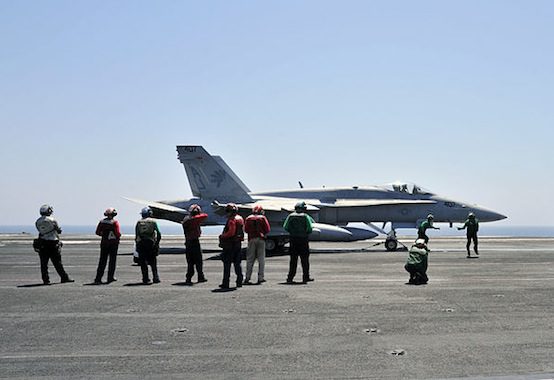Yemen and the War on ISIS

Matt Purple wonders if the renewed focus on the war on ISIS will cause the U.S. to drop its support for the war on Yemen:
The United States is bankrolling this distraction by providing equipment and logistics to those attacking Yemen. That bloody little war was always a bad idea. Will we finally withdraw our support and nudge our Sunni allies back to the real fight?
It’s a good question, but we already know what the answer is: no, the U.S. won’t withdraw its support, and the clients that are waging the war on Yemen will continue to neglect the “real fight” because it isn’t the fight that matters to them. Contributions from the Gulf states to the campaign against ISIS were minimal from the start and were never going to be that great. Their support for the “broad coalition” was useful primarily in that it allowed the U.S. to point to regional support for the intervention in Iraq and Syria. No one seriously expected the Gulf states to do more than mount a token effort, because it was understood that this was all that would be offered. When you hear presidential candidates boast that they will use U.S. “leadership” to form a regional Sunni military force to wage a ground war in Syria, as Rubio has done recently, it is safe to laugh at them.
The relatively much greater commitment that the Saudis and their Gulf allies have made in Yemen reflects how much more they care about combating Iranian influence even when there is scarcely any Iranian influence to combat. The campaign in Yemen diverts their resources from what Washington considers the higher priority, but our clients have never seen the war on ISIS this way and it seems unlikely that they are going to start. The U.S. ought to stop supporting the Saudis and their allies in Yemen, but that would be the right and smart thing to do regardless of the effect it might have on any other issue. Unfortunately, we can be fairly sure that isn’t going to happen.
Even if the U.S. withdrew its support from the war on Yemen and prevailed on the coalition governments to halt their campaign and blockade, that wouldn’t necessarily mean that they would increase their support for the war on ISIS. This article helps explain why:
“The Gulf states are pursuing contradictory policies,” suggests Abdullah Saleh Baabood, an Omani academic. “On the one hand there is this official undertaking to fight Daesh but at the same time they are involved in a struggle against what they consider to be the Shia/Persian domination of the region. Yes, they want to be seen to be helping their allies but they are deeply concerned about domestic views. They don’t want to be seen to be fighting Sunnis [bold mine-DL]. It is a very difficult situation for them.”
The U.S. wants these client states in the anti-ISIS coalition because their countries are predominantly Sunni, and yet it is because of sectarian considerations that they would rather focus on attacking the allies and proxies (real and imagined) of Iran. The thing that supposedly makes these states valuable in opposing ISIS is what makes them ignore the fight against ISIS in favor of attacking Shi’ites and their allies across the region. The U.S. should end its involvement in the war on Yemen, and it should also seriously reevaluate what benefit the U.S. derives from having clients that consistently work at cross-purposes with our policies.
Comments